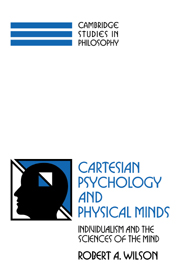Book contents
- Frontmatter
- Contents
- Preface
- 1 Introduction: What is individualism in psychology?
- PART I ON ARGUMENTS FOR INDIVIDUALISM
- PART II PSYCHOLOGICAL EXPLANATION AND MENTAL CAUSATION
- PART III THE CASE AGAINST INDIVIDUALISM
- 8 The causal depth and theoretical appropriateness of wide psychology
- 9 Individualistic visions of psychology: prospects and problems
- 10 Conclusion: Cartesian psychology and the science of the mind
- References
- Index
8 - The causal depth and theoretical appropriateness of wide psychology
Published online by Cambridge University Press: 05 June 2012
- Frontmatter
- Contents
- Preface
- 1 Introduction: What is individualism in psychology?
- PART I ON ARGUMENTS FOR INDIVIDUALISM
- PART II PSYCHOLOGICAL EXPLANATION AND MENTAL CAUSATION
- PART III THE CASE AGAINST INDIVIDUALISM
- 8 The causal depth and theoretical appropriateness of wide psychology
- 9 Individualistic visions of psychology: prospects and problems
- 10 Conclusion: Cartesian psychology and the science of the mind
- References
- Index
Summary
Although the debate over individualism has attended to empirical research in psychology, it has not focussed explicitly on the criteria for evaluating causal explanations. In this chapter I introduce two related aspects to explanatory power, causal depth and theoretical appropriateness, and offer the following argument against individualism. We do and should, ceteris paribus, prefer causal explanations that exhibit these explanatory virtues. When other things are equal, wide psychological explanations of behavior are sometimes causally deeper and more theoretically appropriate than their narrow rivals. Therefore, in at least some cases, we should reject narrow explanations in favor of wide explanations of behavior because of the latter's greater explanatory power.
Some of the details of this argument against individualism also provide reasons for rejecting neurosdentific explanations in favor of intentional explanations of behavior; the argument is thus secondarily directed at eliminative materialism, particularly versions that concentrate on our folk psychology (P. M. Churchland 1981; P. S. Churchland 1986; Ramsey, Stich, and Garon 1991). Individualists and eliminativists both ascribe primacy to intrinsic physical properties in scientific explanation, and so focus on the issue of how a properly scientific psychology is to be integrated with the developing neurosciences and computer science. This chapter aims to show why this view and the focus it engenders should be rejected.
The complete argument is developed in four stages. First, I provide an account of the explanatory virtues of causal depth and theoretical appropriateness (§1).
- Type
- Chapter
- Information
- Cartesian Psychology and Physical MindsIndividualism and the Science of the Mind, pp. 187 - 214Publisher: Cambridge University PressPrint publication year: 1995

